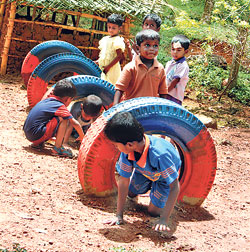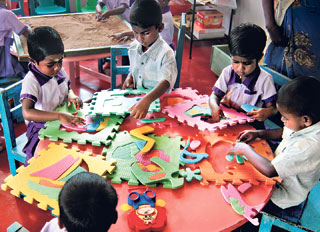
Growing a new lifestyle on estatesEvery morning, N. Selvarani (34), a tea plucker and mother of four based in Elpitiya estate, Talawakelle, dispatches her three older children to school and drops off the youngest at the “pillei kamara” (children’s room), the estate version of a day-care centre, before setting off for her day’s duties on the estate’s hill slopes. Once upon a time the “pillei kamara” on a tea estate was a dingy single line room where babies were put in the care of an old “amme”, usually a retired plucker from the estate itself. The modern pillei kamara is a very different kind of place. Officially known as Child Development Centres (CDCs), the modern pillei kamara is manned by trained teachers and matrons. No more are estate children confined to makeshift sari cots in dark rooms. Many CDCs have in place a staff of teachers and carers to look after children of different ages. Children under two years are put in the care of trained nurses and matrons, while the older children are supervised by trained teachers.
The CDCs are set up and funded by the estates. There are some 1,580 CDCs in the 432 estates that comprise the country’s plantation sector. Each child is closely monitored, and individual records kept. “The CDC gives the children a midday meal specially prepared with the children’s nutrition needs in mind,” said Senarath Pahathkumbura, general manager, Elpitiya Plantations Ltd. “The CDC is equipped with all the facilities needed for a child’s development, such as toys and learning equipment. There are cots for the babies. The teachers and matrons are trained in child care and child development. The children of estate workers receive similar, if not better, care as any average child in the surrounding villages.” The purpose of these centres is to reduce the burden on estate mothers and contribute towards the growth and development of the children of estate employees. The centre’s facilities are not limited to tea plucker mothers based on the estates. Mothers who happen to be working in Colombo or overseas, such as the Middle East, can have the same benefits for their children for a nominal fee of Rs. 300 a month. “We don’t make a distinction between mothers working on the estate and mothers working elsewhere,” said Sanjeewa Doranegama, superintendent of an estate in Pallegoda. “All children admitted to a CDC are looked after during the day. The children usually have at least one family member – a grandmother, grandfather or other relative – working on the estate, or someone who is a retired employee.” The CDCs are just one aspect of a comprehensive makeover underway to improve the quality of life of estate workers on plantations around the country. The infamous line rooms that used to be the workers’ quarters since colonial times are becoming a thing of the past. In their place now stand single or two-storeyed houses. In striking contrast to the old line rooms, where often several generations of a family would be found living in a single room, the new houses offer two bedrooms, a sitting room, a kitchen and an attached toilet. The single housing units come complete with electricity and water facilities and a small plot of land for a home garden where families can grow vegetables if they wish.
All the country’s plantation companies are taking this initiative to transform the lives of their workers. To date, 25,000 houses have been built, and 128,000 members of a total estate labour force of 230,000 have moved out of the old line rooms. The houses are built on a self-help basis. Beneficiaries are given a plot of land (7 perches) by the plantation companies, along with low-interest loans and building materials. Recipients of these benefits are expected to work on the estate for a minimum of 15 years. “We issue a soft loan of Rs. 100,000, repayable in 15 years, and another grant of Rs. 85,000,” said Mr. Pahathkumbura. “We also give transport assistance and other help to obtain materials. Some of the materials are available on the estate itself, and these are given free of charge. We also buy the estate workers roofing and wood panelling for their homes.” The loans are given through the Plantation Human Development Trust, an association with representation from trade unions, the state sector, donor agencies such as the World Bank and the Asian Development Bank (ADB), as well as private plantation companies. The trust spends more than Rs. 311 million a year on worker welfare. Funding for housing schemes and most other welfare activities comes from donor agencies and the government. The trust’s administration expenses are borne by the regional plantation companies. Owning a house, however, is not necessarily the dream pursuit of all estate employees, according to Buddhika Weerakoon, superintendent of Neuchattel estate in Bandaragama. It is not uncommon to see money given for housing being wasted on alcohol, he said. “Alcoholism is one of the major problems we face on estates,” Mr. Weerakoon said. “Many employees are intoxicated by evening with kasippu (an illicit liquor). They have no money left to spend on their house or any other welfare activity. Most of them think only about enjoying today. They are not interested in investing for tomorrow.” Illicit liquor is a serious problem on estates, especially among the older generation of estate worker. According to Mr. Weerakoon, the kasippu is brewed outside and smuggled into the estates. Complaints to the police usually go unheeded.“Hardly any action is taken when we complain to the police,” he said. “Most of the time, the police come and confiscate things, but nothing is done to stop the problem from recurring.” In an effort to combat estate alcoholism, the plantation management has set up support groups and welfare societies that offer counselling by trained personnel. “We have seen many youngsters with addictive tendencies giving up alcohol and straightening out their lives,” Mr. Weerakoon said. “It is a bit difficult with the older generation, but we are making progress.” Habits of saving and investing in the future are slowly taking root on estates. VANISA (Vathu Nivasa Samupakara Samithya), for example, is a society for employees of the Elpitiya plantation. The 1,440 shareholder members have each bought a share for Rs. 250. The society is using this initial capital outlay for lending and investing. To date, the society has lent Rs. 4.5 million to members for agriculture, business ventures, house-building and even the redemption of pawned jewellery. Loans are repaid by direct debit from the members’ monthly salary, so defaulting is uncommon.
The society has more than 1,500 employee savings accounts. Employees are taking the initiative to save for their children’s future, and benefiting from other services such as soft loans to buy their children’s textbooks. Other initiatives are on the agenda.“We want to start a bakery and a salon,” said VANISA vice-chairman, R. Ayyawu. “We also want to start a milk collection service. Many estate workers raise cattle for additional income. We also have a coffin business. When there is a death, members of the family of the deceased can buy a coffin on the estate itself, rather than go into town. This way they save a lot of money and give the society additional income.” Entrepreneurial ventures, from modern housing to soft loans and other benefits, promise a bright future for the estate community. Estate workers need no longer be viewed as “captive labour”, as in the past. At a time when many estate workers, especially the younger generation, are looking beyond the estates to further their careers, it becomes all the more important that the plantation management looks after those who remain and ensures they have a better future. |
|
||||||
|| Front
Page | News | Editorial | Columns | Sports | Plus | Financial
Times | International | Mirror | TV
Times | Funday
Times || |
| |
Reproduction of articles permitted when used without any alterations to contents and a link to the source page.
|
© Copyright
2008 | Wijeya
Newspapers Ltd.Colombo. Sri Lanka. All Rights Reserved. |


